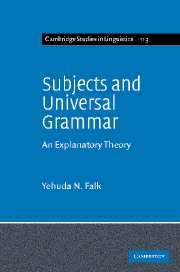6 - Universality
Published online by Cambridge University Press: 22 September 2009
Summary
Non-subject languages
The question has often been raised whether the concept of subject is relevant for the grammars of all languages. As noted in Chapter 1, such a claim has been made for a class of languages which we have referred to as non-subject languages. In this chapter, we will explore the question of the universality of the subjecthood functions.
In a sense, we have already answered the question about universality of the subj function in the negative. In the theory proposed here, subject is not a universal grammatical function: it is merely the intersection of the grammatical functions and piv in those languages (the uniform-subject languages) in which they always coincide. In mixed-subject languages there is no equivalent to the notion subject. However, this just pushes the question back a step; the same question can be asked about the functions and piv. Are they a necessary part of the grammar of every language? In this chapter, we explore this question.
The question of the applicability of the theory we have developed here to non-subject languages has important implications for linguistic theory, and the concept of Universal Grammar. It is part of a broader question: the universality of grammatical functions in general. The conception of grammar that we have adopted here assigns grammatical functions an important role in determining the properties of syntactic constructions.
- Type
- Chapter
- Information
- Subjects and Universal GrammarAn Explanatory Theory, pp. 163 - 196Publisher: Cambridge University PressPrint publication year: 2006



